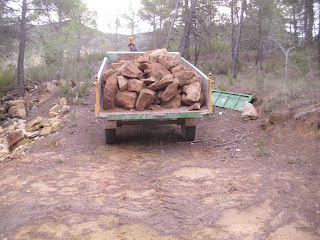So we stayed in La Fresneda, our village in Spain, for
Christmas – and what happened? Not a lot.
The long term weather forecast predicted cold but sunny for
us all over the Christmas period. It was wrong. I was working happily in my
Tshirt on the Sunday before Christmas and on
Christmas Eve (my woman’s birthday) we sat drinking coffee on the
terrace of a lovely hotel located in the depths of the countryside near here
drenched in sun and in temperatures approaching twenty degrees (that’s sixty-eight
for Fahrenheit folk).
The hotel is called Torre del Visco and locally pronounced with
awe. Our friend Jet, who now owns a camp site nearby, used to be the
receptionist at the place and was actually instructed to ask potential
customers if they were aware of the prices before accepting a reservation – simply
to avoid heart stopping moments when the bill was presented. But La Crisis (the
Spanish name for their current financial condition) reaches everywhere and we,
as the only people for lunch, were shown around the place by the manageress and
treated so gushingly by her overly enthusiastic
Swedish assistant that I really believed that I could ask for anything. Yes
anything.
After a siesta we set out at eleven or so that night for a
pub tour of our village. This didn’t take long since there are only two bars
and it was a little disappointing. The promised music and dancing in the second
bar did not materialise. There was music, but just recorded stuff, and no
dancing. In fact all seemed much as usual in Lo Coscoll except for two things:
first of all most people seemed to be companionably drunk, and second everybody
was smoking (yes they do have a smoking ban in Spain, hence the surprise).
Christmas day was cloudy but warm. We went to the bar again
only to find it virtually empty and Raul, the barman, keen to close up and
celebrate Christmas with his girlfriend’s family – then return in the evening
to open the bar again - so we strolled around the seemingly empty, completely
silent village. We did meet one person, Carlos, but he is Swiss and has
obviously taken an assumed name and can therefore be discounted. Then home for
the Christmas dinner which featured turkey with a pop up. Margaret had already told
me about the pop up and I was intrigued. In my imagination I thought of the
first Alien film: the scene where the alien pops out of an astronaut’s stomach.
The reality was a little disappointing: the pop up is a white plastic tube with
a red end which rises when the inside of the turkey has reached a certain
temperature. I experimented with it afterwards. It works like a car thermostat
I believe - based on wax. It could be placed in old people’s ears to indicate
when they have been sitting for too long in front of the fire. I’m saving mine.
Boxing days I usually take a long walk. In England it is
cold so I dress up well. Here it was warm and sunny. Mostly I walked in shirt
sleeves. I used the time to trace the
origins of the asequias (aquifers?) that keep our land supplied with water, but
didn’t reach the place where they are diverted from the main river. Next year I
will find the source. For most people here the day is a normal working day and
thankfully the bar was open as I trudged tiredly back into the village for a
well deserved pint (half litre of Heineken actually, but when in Rome).
In the evening friends came round. We drank a lot
(beer,wine, cava, port), ate a lot, sang carols, played poker dice, talked a
lot and went to bed late. Usual Christmas really, but warm outside and in.





